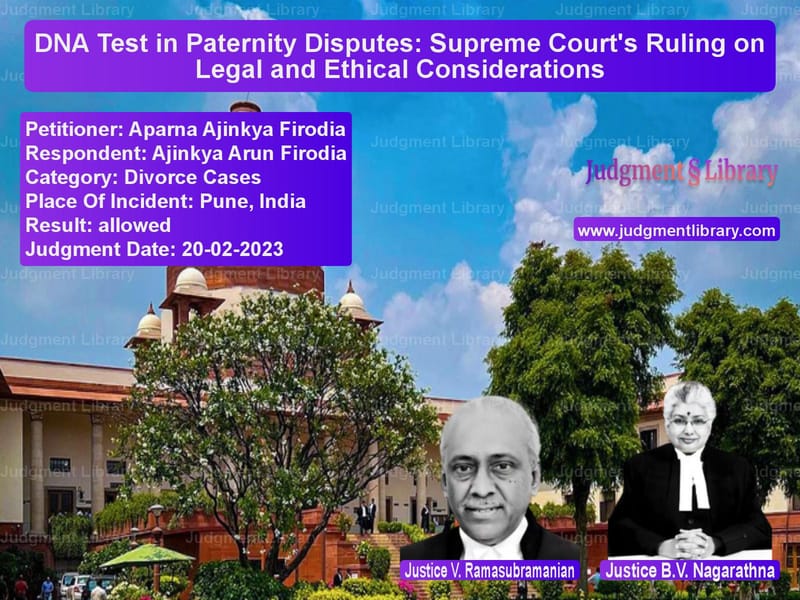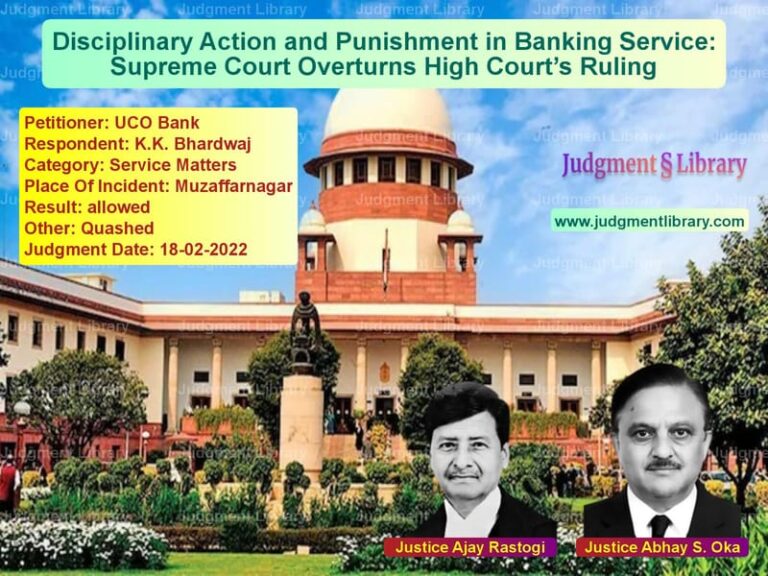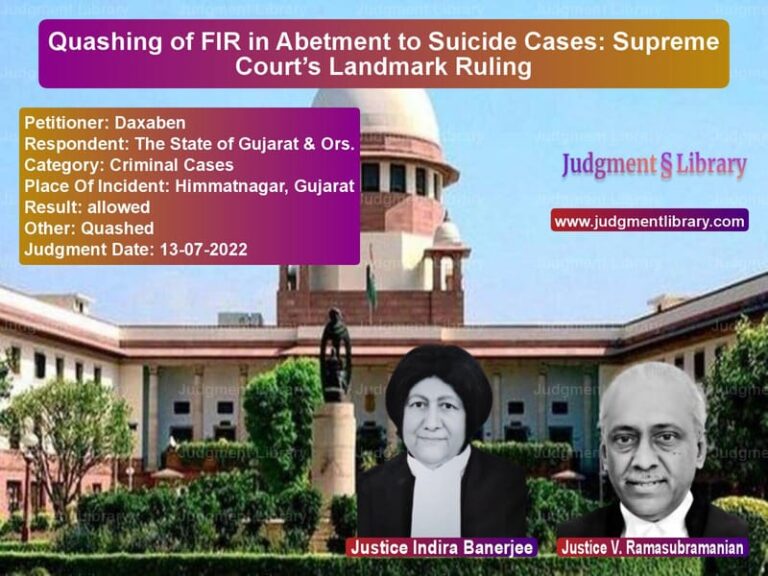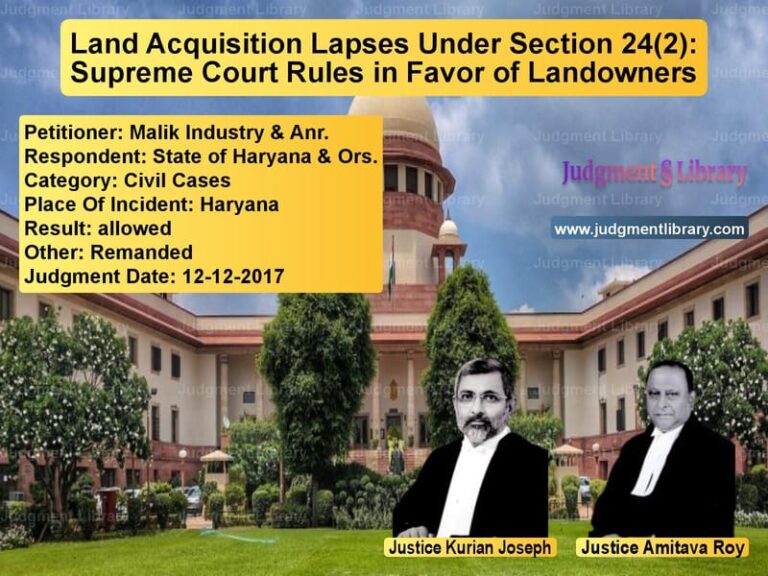DNA Test in Paternity Disputes: Supreme Court’s Ruling on Legal and Ethical Considerations
The Supreme Court of India recently delivered a significant judgment in the case of Aparna Ajinkya Firodia vs. Ajinkya Arun Firodia, addressing the contentious issue of paternity disputes and the role of DNA testing in marital conflicts. The central question before the Court was whether a husband can demand a DNA test to challenge the paternity of a child born during wedlock, particularly when such a demand is based on allegations of adultery.
Background of the Case
The petitioner, Aparna Ajinkya Firodia, and the respondent, Ajinkya Arun Firodia, were married in 2009. The couple had two children. However, disputes arose between them, and the respondent alleged that the second child was not biologically his. He claimed that his wife had engaged in an adulterous relationship and that the child was born as a result of that affair. The respondent sought a DNA test to establish non-paternity.
The petitioner opposed the DNA test, contending that such an order would violate the child’s right to legitimacy and privacy. She argued that the legal presumption under Section 112 of the Indian Evidence Act, 1872 strongly favors the legitimacy of children born during a valid marriage unless it can be conclusively proven that the husband had no access to the wife at the time of conception.
Petitioners’ Arguments
- The petitioner contended that allowing DNA tests in paternity disputes would lead to an erosion of the sanctity of marriage and legitimacy principles enshrined in Indian family law.
- She relied on Section 112 of the Indian Evidence Act, which states that if a child is born during the continuance of a valid marriage or within 280 days of its dissolution, the child is presumed legitimate unless the husband proves non-access.
- The petitioner emphasized that ordering a DNA test based solely on a husband’s allegations of adultery would have far-reaching consequences on children’s rights, their dignity, and their social identity.
- She argued that the Indian Constitution guarantees every individual, including children, the right to privacy, and compelling a DNA test without solid legal grounds would infringe upon this fundamental right.
Respondents’ Arguments
- The respondent claimed that he had sufficient reasons to believe that the second child was not biologically his, justifying the need for a DNA test.
- He contended that since DNA testing is conclusive scientific proof, it should override legal presumptions and be used to establish paternity beyond doubt.
- He relied on previous Supreme Court judgments, such as Nandlal Wasudeo Badwaik vs. Lata Nandlal Badwaik, where the Court held that truth should prevail over legal fictions.
- The respondent also argued that denying a DNA test would amount to suppressing evidence, depriving him of his right to know the truth.
Key Observations by the Supreme Court
The Supreme Court carefully analyzed the constitutional and legal aspects of the case before delivering its verdict:
- The Court reaffirmed the legal presumption under Section 112 of the Indian Evidence Act, stating that legitimacy must be upheld unless clear evidence proves non-access.
- It emphasized that while DNA testing is a powerful tool, it cannot be allowed to undermine the stability of family structures and the dignity of children.
- The Court clarified that allowing unrestricted DNA testing would create a precedent where any husband could challenge paternity at will, leading to immense psychological and social harm to children.
- The judgment noted that privacy is a fundamental right, and compelling DNA testing without solid evidence of non-access would violate this right.
- The Court ruled that mere suspicion of adultery, without conclusive evidence of non-access, is not sufficient to order a DNA test.
Judgment
Based on its observations, the Supreme Court ruled as follows:
- The request for a DNA test was denied, and the presumption of legitimacy under Section 112 of the Indian Evidence Act was upheld.
- The Court held that the dignity and privacy of the child must be protected, and paternity challenges should not be entertained lightly.
- It was reiterated that a husband must provide clear and irrefutable evidence of non-access before seeking a DNA test.
- The respondent’s appeal was dismissed, and the Court directed that no adverse inference be drawn against the petitioner for opposing the DNA test.
Implications of the Judgment
This ruling has far-reaching implications for family law and privacy rights in India:
- Strengthening the Presumption of Legitimacy: The judgment reinforces the principle that children born within a marriage are presumed legitimate unless proven otherwise by clear evidence of non-access.
- Preventing Misuse of DNA Testing: The ruling discourages frivolous requests for DNA tests in marital disputes, ensuring that such requests are granted only in exceptional cases.
- Upholding Privacy Rights: The decision aligns with the Supreme Court’s previous rulings on privacy, ensuring that individuals are not subjected to intrusive testing without compelling legal grounds.
- Protecting Children’s Welfare: The judgment prioritizes the best interests of children, safeguarding them from unnecessary legal battles over their parentage.
Conclusion
The Supreme Court’s decision in this case is a landmark ruling that upholds the sanctity of marriage, the dignity of children, and the fundamental right to privacy. By denying the request for a DNA test, the Court has reinforced the legal presumption of legitimacy while ensuring that family disputes are not used as grounds for baseless paternity challenges. This judgment sets a significant precedent for future cases involving paternity disputes and the use of DNA testing in Indian family law.
Petitioner Name: Aparna Ajinkya Firodia.Respondent Name: Ajinkya Arun Firodia.Judgment By: Justice V. Ramasubramanian, Justice B.V. Nagarathna.Place Of Incident: Pune, India.Judgment Date: 20-02-2023.
Don’t miss out on the full details! Download the complete judgment in PDF format below and gain valuable insights instantly!
Download Judgment: aparna-ajinkya-firod-vs-ajinkya-arun-firodia-supreme-court-of-india-judgment-dated-20-02-2023.pdf
Directly Download Judgment: Directly download this Judgment
See all petitions in Alimony and Maintenance
See all petitions in Child Custody
See all petitions in Domestic Violence
See all petitions in Mutual Consent Divorce
See all petitions in Property Division in Divorce Cases
See all petitions in Judgment by V. Ramasubramanian
See all petitions in Judgment by B.V. Nagarathna
See all petitions in allowed
See all petitions in supreme court of India judgments February 2023
See all petitions in 2023 judgments
See all posts in Divorce Cases Category
See all allowed petitions in Divorce Cases Category
See all Dismissed petitions in Divorce Cases Category
See all partially allowed petitions in Divorce Cases Category







